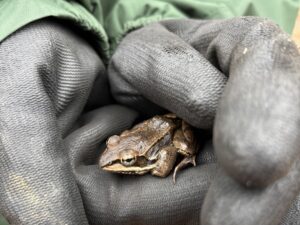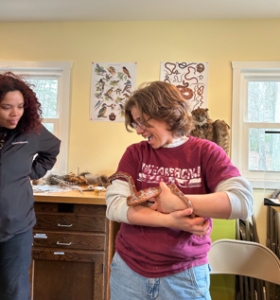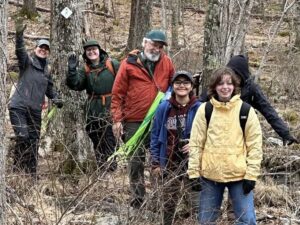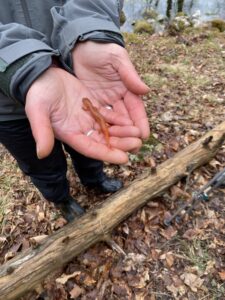- About Ramapo
- Academics
- Admissions & Aid
- Student Life
- Athletics
- Alumni
- Arts & Community
- Quick Links
- Apply
- Visit
- Give
Into the Woods: Ramapo Partners with Conservation School for Hands-On Science Education

June 26, 2025
by Lauren Ferguson
Ramapo College of New Jersey Social Work major El Sharo ‘28 has spent a total of just two days at the New Jersey School of Conservation in Sussex County – but just like so many who visited the site before and will visit it after them, its impact will last a lifetime.
Sharo, of Midland Park, NJ, took part in a pair of Ramapo-organized trips to the environmental education center located on a 240-acre tract of forested land in Stokes State Forest.
“Some children grow up in towns where they’re not exposed to any wildlife or nature at all, tucked away in homes of concrete and streetlights. The New Jersey School of Conservation has these invaluable programs that provide these students with not only education about the world around them, but a connection to it with first-hand experience,” said Sharo. “That cannot be replicated in a classroom, the wonder of looking up at trees that are hundreds of years old can’t be recreated with a smart board and some markers.”
Sharo’s first time on the site was on an excursion with about 40 other incoming Ramapo students, as part of the college’s Leaders in Service program. The initiative allows incoming first-year and transfer students to get involved with service projects, political engagement, and leadership opportunities before their initial semester even begins.
“We got to take in the beautiful sights, row on beautiful bodies of water, and build trust, not only with each other, but in ourselves with group games and challenges,” they explained. That experience made such an impact on Sharo, that they signed up for an alternative spring break trip back to the school.
Alternative break trips, organized by Ramapo’s Center for Student Involvement, are geared toward offering students the chance to engage in civic learning and community service over scheduled breaks from classes. Sharo was part of a group of students who helped reblaze and reroute the Green Darner trail that weaves through the wooded land, removing old markers and replacing them with fresh, new ones. The group also hiked to a vernal pool – a small body of water that only appears at certain times of the year.
They spotted creatures such as northern red, redback, and leadback salamanders and heard the mating calls of wood frogs, a species native to New Jersey that can only reproduce in vernal pools.
“Due to climate change, vernal pools are appearing less and less every year,” said Sharo, explaining what they learned. “As these frogs decrease in number, that upsets the whole rest of the ecosystem, showing the profound impact that even the smallest creature has on the wider forest.”
The mind-opening trips for students like Sharo are just one of the ways that Ramapo College partners with the school that over its 71-year history has served more than 500,000 students, teachers, masters and doctoral students, faculty and visiting professionals through nearly 40,000 workshops and environmental education programs, according to the school.
The New Jersey School of Conservation is also one of three regional training centers, where Ramapo delivers in-person training to K-12 teachers and educators through the New Jersey Department of Education’s Climate Change Learning Collaboratives initiative. The grant-funded program trains teachers on how to infuse climate change into the curriculum.
“We’re not just talking about climate change, we are talking about hands-on science and how we adapt that into our curriculums,” explained Dr. Adam Fried, assistant dean of teacher education at Ramapo, who oversees the Climate Change Learning Collaborative at Ramapo. Fried is also a former science educator and superintendent.
Through the collaborative, over the past year more than 1,000 educators attended sessions at three sites: the New Jersey School of Conservation; the Meadowlands Environmental Center in Bergen County; and the Great Swamp Watershed Association in Morris County. The New Jersey School of Conservation itself held 10 workshops, hosting 49 school districts from throughout New Jersey, and reaching nearly 180 participants.
Through the collaborative, educators can sign up for full-day workshops held at the New Jersey School of Conservation that delve into climate change’s impact on issues such as the weather, wildlife, health and climate justice, specifically for New Jersey. Morning presentations explore the impacts of and solutions to the issues facing the Garden State. In the afternoon, participants partake in field-based activities in Stokes State Forest. Educators leave with materials to turnkey lessons back to any classroom setting that will help them focus on their own communities.
“When you get your hands dirty, when you’re teaching science, that child and that staff member will remember that forever. And that’s what the New Jersey School of Conservation does, it gets them into the weeds, into the lake, into the marsh, and that cannot be replaced,” he said.
Copyright ©2026 Ramapo College Of New Jersey | Statements And Policies | Accessibility | Contact Webmaster.




Follow Ramapo